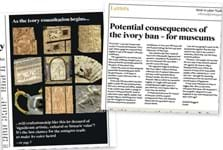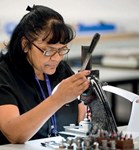The outline of the ban, published by Defra on April 3 after a public consultation in late 2017, allows only a small amount of antique exemptions that require certification.
No date has been set for bringing the legislation before parliament. In the interim, a coalition of antiques trade bodies and collectors led by BADA and, in a separate initiative, the Public Monuments and Sculpture Association (PMSA), are consulting lawyers about the ban.
The PMSA is examining the potential to legally challenge the ban, the government’s liability for compensation payments and the consultation process itself.
BADA, in partnership with LAPADA and auctioneer body SOFAA, is being less specific on the details of its legal probe, except to say it focuses on “a possible range of issues relating to the proposals”.
The advice the group receives “will be considered, with the aim of forming an agreed plan of action”, BADA said.
Responding to the moves, a Defra spokesman told ATG: “The consultation ran for 12 weeks and we engaged with stakeholders and gathered information. The ivory sales ban takes account of the views and evidence received.”
Destruction concerns
The PMSA, a charity that seeks to preserve, protect and promote Britain’s sculptures, is concerned a near-total ban will result in “the destruction or loss of thousands of fine sculpted works in ivory which will be rendered valueless”.
“The questions gave the impression of seeking justification for a decision already taken
The charity’s chairman, John Lewis, is asking for counsel’s opinion on whether the intended legislation “contravenes human rights legislation and the protection of personal property as it confiscates, without compensation, the value of sculpted ivory less than 100 years old”. The PMSA also suggests the consultation was not conducted and concluded in an impartial and proper way.
In a letter to ATG, Lewis writes: “The questions [the consultation] asked gave the impression of seeking justification for a decision already taken. It was no consultation at all and savoured more of a ‘show trial’ than a genuine wish to hear from those affected.”
If the PMSA receives favourable legal opinion, it would then raise funds for legal action. BADA is also asking that people wishing to donate to support its initiative should contact Mark Dodgson, BADA secretary general at mark@bada.org or call 020 7589 4128.
‘Self-interest’
The PMSA believes the antiques trade’s arguments in favour of carefully managed commerce were interpreted as self-interest.
Lewis told ATG: “We have been too weak in listening to and accommodating the views of [the animal conservation lobby] which has resulted in a situation which contravenes all canons of natural justice. Hopefully Defra will listen.”
In announcing their responses, the trade bodies restated their abhorrence of modern poached ivory. “BADA, its members and the trade more widely are united in their opposition to illegal trade in poached ivory,” BADA said.
ATG’s guide to the UK Ivory Ban















